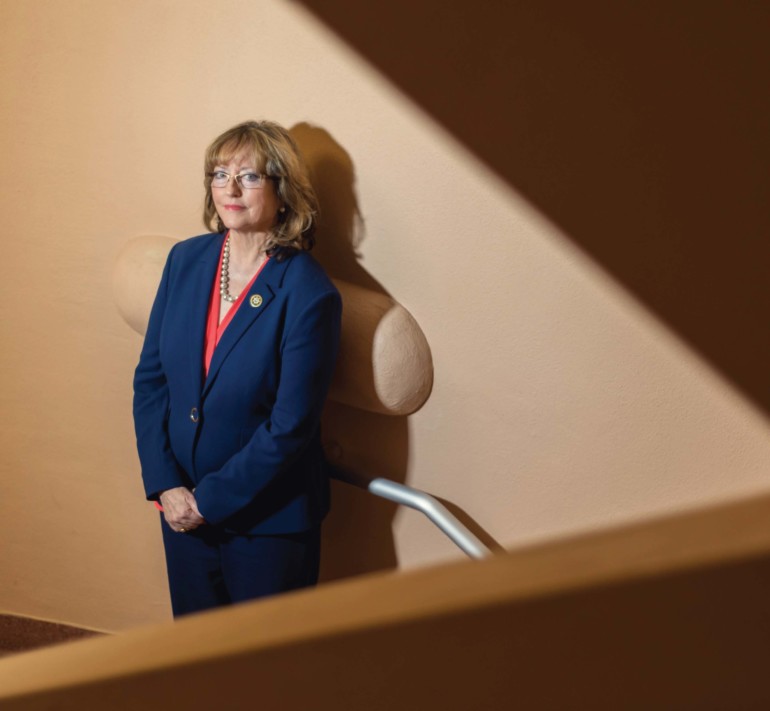SAYING IT WAS a close race is a big understatement. Last November, after three weeks of counting ballots once the polls closed, Lori Frugoli was named Marin’s new district attorney. The 28-year veteran of the DA’s office narrowly defeated Anna Pletcher, a Mill Valley resident and prosecutor with 10 years of experience at the U.S. Department of Justice’s office in San Francisco. With 132,000 ballots counted, Frugoli won by 386 votes — less than 0.3 percent of the total votes cast. Many observers say the difference came down to Frugoli’s proverbial “hometown advantage.”
Let’s face it, Frugoli is Marin through and through. Now 62, she came to the county at an early age and attended Mary E. Silveira Elementary School, Miller Creek Middle School, Terra Linda High and College of Marin before receiving her bachelor’s degree from nearby Sonoma State University. She was a police explorer scout, a meter maid, a police officer in San Rafael and Marin County Deputy Sheriff before joining the Marin County District Attorney’s office in the early 1990s. After earning a law degree from Golden Gate University’s School of Law, as a Marin County deputy district attorney she prosecuted in more than 100 jury trials involving such crimes as gang violence, child molestation, elder abuse and consumer fraud.
For 38 years she’s been married to former motorcycle police officer and San Rafael city councilman Gary Frugoli, and the couple lives in Novato. Off-duty, she rides and shows horses. Despite years of dealing with society’s worst elements, Marin’s recently elected DA has a lighthearted manner and seems disinclined to take herself overly seriously. She smiles easily and laughs often.
What are the changes you hope to make in Marin’s DA office?
Basically, it is to get out into the community and let people know we are here to help; our motto is “Connecting the Community to the Courthouse.” We now have a video explaining what the district attorney’s office does that I’m anxious to share with seniors’ groups, to service clubs and wherever people gather. To me, community engagement is a huge part of our job that we never really embraced before. We have victim witness advocates that help victims and a specialist who helps get restitution for the losses they have suffered. We have a consumers’ unit that looks at instances where people feel they’ve been ripped off. And we have a group of volunteers who mediate cases where there is conflict. Another one of my priorities is making sure the immigrant community knows we’re here to help them; we have people available who speak Spanish and other languages. And this month, I’m involved with programs combating human trafficking and building connections that result in safe and inclusive communities for young and old.
Pardon the naivete, but what is the purpose of the office of district attorney?
You’re not alone: many people don’t understand our office’s mission. It will be a big part of my job to demystify and destigmatize what our office does. It’s really our job to help protect our communities, allowing them to be safe. That may sound like a police department’s job — and to a degree it is, and we work closely with police departments — but when a police department does something wrong, it’s also our job to call them out on it. Our job is to be out in the community educating people on how to prevent crimes and how not to be a victim of a crime and, when a crime does occur, to represent the victim in court. The DA’s office has a role not only in the county’s unincorporated areas, but also in each of Marin County’s towns and cities.
And how do you do that?
It works like this: when a crime is committed, a police officer takes a report; that report then comes into our office and is reviewed and a determination is made as to what, if any, charges will be filed. If the charges merit it, the crime then goes to court and my office, acting as “the People of the State of California,” represents the victim. Depending on the charges, the victim of the crime isn’t always named; rather, it is all of the people in California who are essentially “the victim” of a crime and they, represented by the DA’s office, are the ones bringing a case against the crime’s perpetrator. To achieve this, the district attorney’s office has over 80 employees and a budget of $18 million. Organization-wise, there’s myself and the two chief district attorneys who work directly with me. Then there are 27 deputy district attorneys who take the cases to court; balance of our staff are critical support staff, investigative staff, victim witness staff, analyst and clerical positions.
Where does Marin stand statistically regarding crime?
The number one crime in Marin County is driving under the influence of alcohol, or DUI. We had over 1,200 misdemeanor DUIs in 2018 and 2017. During those years the county’s number 10 crime was domestic violence; between those two are things like public intoxication, theft, possession of drug paraphernalia and credit card fraud among other crimes. Around 80 percent of the county’s crimes are misdemeanors, not felonies, but presently we are prosecuting five murder cases. So, we’re rather lucky; ours is a relatively safe district. However, there’s a reason why: there’s good law enforcement out there doing their job, and we’re doing a good job of prosecuting cases in order to cut down on recidivism. The number one crime in Marin County is driving under the influence of alcohol, or DUI.
How has crime in Marin changed?
I can tell you we now spend a good portion of our time doing things that 10 years ago we didn’t do. We spend considerable time and resources working on people’s mental health and homelessness issues. The old “lock them up” days are over. Now there is a lot of social work we’re involved with and most people don’t realize that. What many on the outside don’t realize is that if this is a DUI case, and the accused pleads guilty, the case may take two hours of our time start to finish. Yet if the file is a mental health case, say something simple as trespassing or drunk in public, the case may take up to 30 hours to process. And nobody has been quantifying this allotment of time, [which is the case] not only in my office but in law enforcement too. This is important information and it is my intention to keep better track in our office to optimize the efficiency of our time and resources.
In one capacity or another, you’ve been working in Marin’s district attorney’s office for about three decades. Why after all that time did you want the top job?
I thought it was time for more positive and connective changes and that I had the knowledge, experience and trust relationships established to make those changes. Going back to the 1990s, I’ve worked for four different Marin district attorneys and I think having that history is a powerful tool for me moving forward. I’ve seen things that worked wonderfully and things that were not so wonderful and I’ve actually used some approaches from way back when that have worked very well.
After the election, was it agonizing for you during the vote count?
You mean the waiting? My perception was that I’ve prosecuted in over 100 jury trials and the waiting for the final election results was just like waiting for a final jury decision. You hear that the jury has reached a decision, so you rush to the courthouse all excited only to find the jury has another question or wants more testimony. And then they call you again, and again it’s only for a question, not a verdict. I had gotten used to that, so I used it as an analogy for waiting for the final election result. And it really was like waiting for a verdict, and it turned out to be a good verdict. It was well worth the wait.


